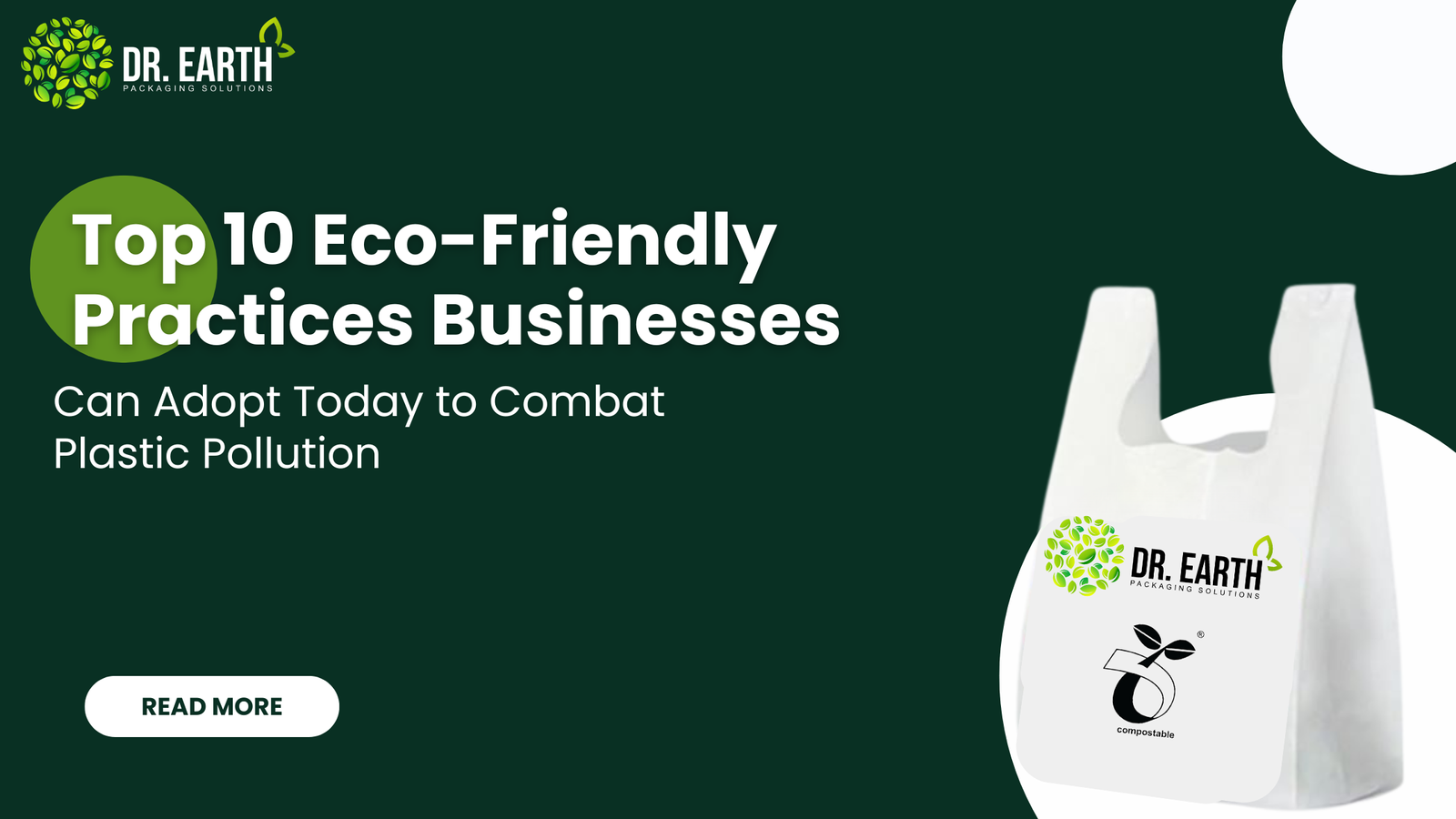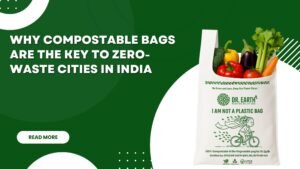
Plastic pollution is one of the major environmental threats in the modern world. Plastic waste does not only damage ecosystems but also endangers both wildlife and human health as well from landfills to oceans. Businesses, in general, and especially food services, retail, and hospitality are one of the leading causes of plastic pollution. However, they also have the potential to make a huge difference. Companies may play an important role in reducing plastic waste by accepting the most Eco-Friendly Practices measures and alternatives.
We’re going to check out the top 10 eco-friendly practices businesses can put in place today to tackle plastic pollution. From biodegradable bags and compostable bags to the circular economy model, every one of these practices will help lessen your business’s footprint on the earth while saving the planet and building the reputation of your brand.
1. Switch to Biodegradable and Compostable Bags
The easiest, most effective step a business can take would be to replace traditional plastic bags with biodegradable or compostable bags. While it takes hundreds of years for plastics to break down, biodegradable bags decompose easily in a short period, making them much more environment-friendly.
Dr. Earth is one of the companies leading in the industry that produce compostable bags from natural ingredients such as cornstarch, which degrades without toxic chemicals. That kind of bag is very important to businesses conscious of the environment. It reduces their usage of harmful plastic and goes a long way to make the environment sustainable.
Among companies engaging high consumer usage of plastic bags- retail, food services and hospitality, compostable bags promote sustainability while offering a functionality and quality option to clients in use cases.
Action Steps:
- Exchange all single-use plastic bag with biodegradable as well as compostable one.
- Promote the replacement on your website, at in-store signage and at social media.
2. Eliminate Single-Use Plastics in the Workplace
Another excellent step is to eliminate single-use plastics in the workplace. Single-use plastics, including plastic cups, cutlery, straws, and bottled water, are significant contributors to plastic pollution. These items can be replaced with reusable or compostable alternatives made from bamboo, metal, or paper in the workplace.
Through promoting the use of reusable water bottles, coffee cups, and containers, businesses will significantly reduce their plastic footprints and encourage sustainability cultures in the workplace. Companies are also taking action on strong stances against plastics through the use of biodegradable packaging bags as well as compostable packets for office use.
Action Steps:
- Provide the reusable coffee cups, water bottles, and utensils
- Change all the single-used and plastic packaging products in your company to sustainable versions.
3. Offer Eco-Friendly Packaging to Customers
Retail and food-service business organizations are often some of the biggest contributors to plastic pollution in the corporate sector. This can be abated by switching towards ‘eco-friendly’ packages which could be biodegradable bag materials, paper, or any other plant-based package items. These break at an incredible rate compared with the plastic and do not stack long-term waste.
For example, packaging foods in biodegradable bags or placing them in containers made out of cornstarch or sugarcane can decrease the usage of plastics drastically. Companies handling tangible products would also consider using recyclable cardboard or compostable packages to displace plastics instead.
Action Steps:
- Select biodegradable packaging and compostable bags for packaging your products.
- Emphasize eco-friendly packaging on your website and marketing material to attract the environmentally sensitive customer.
4. Promote the Use of Reusable Items
Perhaps the greatest business change is an encouragement of reusable goods for both employees and customers. Replacing the single-use plastic bag with reusable bags made out of natural fibers, cloth, or bioplastics is another business option. The best alternatives in day-to-day life are reusable water bottles, coffee cups, and takeout containers.
Add incentives such as discount or loyalty points for customers when they use their reusable products and build a motivating yet effective way to eradicate plastic pollution in a business setting.
Action Steps:
- Make it a practice by offering reusable bags, containers, and cups as a component of the brand’s environment-friendly ventures.
- Make an offer and promote discounts for bringing those reusable items into the stores or restaurants by your clients.
5. Implement a Take-Back Program for Plastic Waste
Innovative: Offering their customers take-back programs enables them to return their old plastic items, packaging bags, for recycling or disposure to companies, so that it either recycles the product via a near factory for further processes or can give it an alternative use through usage.
For example, enterprises can give rewards to consumers on the return of biodegradable bags or packaging to facilitate proper disposal or composting. Establishing collection sites for wastes can also ensure that plastic is not disposed of carelessly, since businesses close the loop to plastic use.
Action Steps:
- Create collection points of used plastics at your business sites
- Give rewards to customers with returns of used packaging for recycling.
6. Partner with Sustainable Suppliers
sustainability initiatives, your supply chain must also be aligned to your sustainability goals. Only then can you reduce plastic pollution through sustainable suppliers who focus on sustainability.
Engage suppliers who make use of compostable bags, biodegradable packaging, or other materials in their products that are considered eco-friendly. Firms that give much attention to sustainability in their manufacturing process are often willing to spend on green packaging solutions that can cut down significantly the environmental impact of your business.
Action Steps:
- Select suppliers who offer materials that are environmentally friendly and sustainable.
- Incorporate sustainability in supplier contracts and analyze their eco-friendly practices.
7. Educate Employees and Customers About Plastic Reduction
The most powerful tool against plastic pollution is education. Businesses need to train employees on ways of reducing plastic waste, using sustainable alternatives such as biodegradable bags.
In similar ways, educating consumers using the marketing material, the blogs, and social media promotions can prompt them towards being more responsible. In case of the proper waste management and recycling, such educating customers about the use and disposal of compostable bags can prove to be much helpful.
Action Steps:
- Organize internal workshop events or even provide relevant web-based material on decreasing plastic waste.
- Launch educational campaigns on your website and social media about the advantages of biodegradable bags and compostable products.
8. Invest in Sustainable Technology and Recycling Systems
Invest in green technologies such as energy-saving equipment, water-saving appliances, and advanced recycling systems, which can reduce the ecological footprint of your business considerably. For example, closed-loop systems can be set up by businesses where used biodegradable bags, compostable products, or packaging materials are collected, and then they are ensured to be reused, composted, or recycled.
Furthermore, waste-to-energy solutions or composting systems can be adopted in your facilities to reduce plastic waste and convert it into useful resources.
Action Steps:
- Invest in research and technology that promotes sustainability and waste reduction.
- Place recycling or composting bins around your workplace to encourage proper disposal.
9. Go Paperless and Reduce Packaging Waste
Paper may be better to use than plastic, but it will also add to deforestation and generates waste. Businesses should try to reduce their use of paper products: instead of buying printed receipts, switch to digital receipts; use e-billing systems instead of sending paper bills; reduce spending on advertising as well as marketing by shifting to using digital means for promoting products in the market.
Action Steps:
- Convert to paperless invoicing and receipts.
- Promote more digital marketing materials and avoid using too many printed flyers or brochures.
10. Seek Certifications and Recognition for Sustainability Efforts
Obtaining sustainability certifications can help organizations demonstrate their commitment to decreasing plastic waste. Some of these kinds include B Corp Certification, ISO 14001 on the environment for management, Fair Trade Certification, which affords legitimacy to the environmental efforts in your business
These help not only get more customers’ trust but also offer a clear roadmap route for businesses to attain as well as enhance their degree of being Eco-Friendly Practices .
Action Steps:
- Conduct research in the kind of industry certification that falls on sustainability.
- Display your certifications on the website as well as products’ packaging showing your effort.
Conclusion
Plastic pollution has become one of the biggest global crises that can be greatly checked with the might of business in this battle.Implementation of these top 10 practices can help businesses to avoid the use of plastics in the future and create avenues for more sustainable products in the market, like biodegradable bags, compostable bags, and others in eco-friendly packaging.
This shift toward sustainability is a necessity of the future. With such practices, a business will play an integral role in decreasing plastic waste while adding value to the brand name and supporting a cleaner and greener Earth.
FAQs
Q- 1. Why should businesses use eco-friendly packaging?
Ans- Eco-friendly packaging, such as biodegradable bags and compostable bags, reduces plastic pollution and supports sustainability and fulfills the demand of consumers for green products.
Q- 2. How do biodegradable bags reduce plastic pollution?
Ans- This means that the biodegradable bag will decay within the environment and is not taking a very long time compared to plastics, which would take several years, and degrades into non-toxic material that does not cause any harm to the wildlife and the ecosystems.
Q- 3. Can all types of packaging be replaced with biodegradable bags?
Ans- Several kinds of packaging that could be replaced with biodegradable bags, and the kind used for compostable bags especially for food and retail should be proper for application.
Q- 4. Are compostable bags safe for the environment?
Ans- Of course, they are safe since compostable bags consist of natural ingredients and biodisintegrate without producing a dangerous emission of toxic compounds within it and this one is truly beneficial to further increase the enrichment of soils thereby decreasing its amount in the landfill.
Q- 5. How can my business start using eco-friendly packaging?
Ans- Begin with bio-packaging bags and compostable replacement of plastic packaging, and work from there by being an eco-friendly supplier who implements sustainable practices at the supplier level.
Share:
Related Posts














